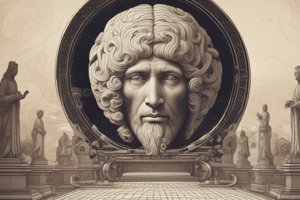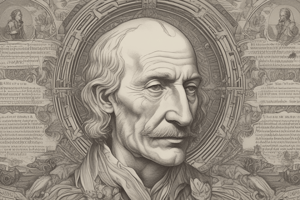Podcast
Questions and Answers
What does John Locke mean by 'tabula rasa'?
What does John Locke mean by 'tabula rasa'?
- The mind has innate ideas at birth.
- The mind only develops ideas from imagination.
- The mind is a blank slate at birth. (correct)
- Knowledge is acquired through revelation.
Which of the following laws does John Locke NOT identify?
Which of the following laws does John Locke NOT identify?
- Civil Law
- Divine Law
- Natural Law (correct)
- Law of opinion
According to David Hume, what are impressions?
According to David Hume, what are impressions?
- Vague recollections of ideas.
- Inherent beliefs within an individual.
- Immediate sensations of external reality. (correct)
- Complex thoughts formed by the mind.
How does Hume describe the self?
How does Hume describe the self?
Immanuel Kant believed the mind's role in knowledge acquisition is:
Immanuel Kant believed the mind's role in knowledge acquisition is:
What is a key difference between Locke's and Hume's view of ideas?
What is a key difference between Locke's and Hume's view of ideas?
Which of the following statements best summarizes Locke's perspective on morals?
Which of the following statements best summarizes Locke's perspective on morals?
Kant's view contrasts with Hume's in that he believes:
Kant's view contrasts with Hume's in that he believes:
What aspect of knowledge acquisition does Locke emphasize that Hume does not?
What aspect of knowledge acquisition does Locke emphasize that Hume does not?
Flashcards are hidden until you start studying
Study Notes
John Locke's Philosophy
- The body functions like a machine, operated by will and supported by the mind.
- Locke argued against innate ideas, proposing that at birth the mind is a "tabula rasa" (blank slate).
- Emphasized that nothing is present in the mind that wasn't first sensed in the external world.
- Knowledge arises from experiences, categorized under a posteriori ideas.
- Two methods contribute to knowledge acquisition:
- Sensation: Direct experience of objects through the senses.
- Reflection: The mind examines previously sensed objects to identify relationships.
- Moral, religious, and political values are derived from sensory experiences, highlighting the absence of innate ideas.
- Introduced three laws regarding human behavior:
- Law of Opinion: Distinction between virtuous actions (praiseworthy) and vices (reprehensible).
- Civil Law: Legal rights enforced by authority figures like courts and police.
- Divine Law: God-established rules that represent the ultimate moral code for human actions.
David Hume's Theory of Perception
- The mind processes sensory input as perceptions, serving as a container for transient sensations and fragmented ideas.
- Two forms of perceptions:
- Impressions: Immediate sensations from external reality; considered more vivid than resulting ideas.
- Ideas: Recollections derived from impressions.
- Impressions are foundational for the formation of ideas; without them, complex ideas cannot develop.
- Human nature, as per Hume, depicts the self as a "bundle" of various perceptions, characterized by continuous change and fluidity.
- Denied the existence of a permanent self; instead, proposed that the self is an imaginative construct.
Immanuel Kant's Contributions
- Stressed the dual importance of experience and reason in shaping understanding and self-awareness.
- Proposed that the mind is not merely a passive recipient but actively engages with sensory experiences.
- Argued that instead of adjusting the mind to the world, the mind shapes the understanding of the external world.
- Asserted that the self is fundamental for knowledge acquisition; without the self, memory and knowledge would not exist.
- When perceiving an object, the self attributes characteristics using the frameworks of time and space.
Studying That Suits You
Use AI to generate personalized quizzes and flashcards to suit your learning preferences.




